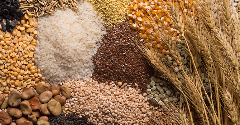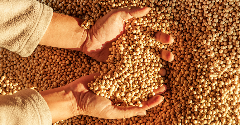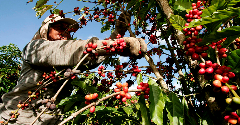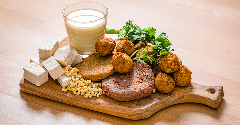sponsored content
Emulsifiers: The micro-ingredient that delivers major value
12 Nov 2018For commercial bakers to create countless numbers of delicious, quality baked goods with the dependable consistency their customers count on, it takes more than the standard flour, sugar and eggs they use when baking for the family at home. Specialty ingredients, such as emulsifiers, help maintain the quality, freshness and integrity of the baked good and help deliver the taste and texture consumers have in mind when they hand over their own hard-earned dough at the register.

What is an emulsifier and how does it work? Many highly experienced bakers really couldn’t say; they just know the difference it makes.
Put simply: An emulsifier is an ingredient that improves the interaction of two or more elements that wouldn’t normally mix -- such as oil and water. In baked goods, emulsifiers help:
In addition to acting as crumb softeners, emulsifiers can also interact with gluten to provide dough strengthening. Dough strengthening emulsifiers provide tolerance in the baking process and reduce the impact of flour quality variation. The improvement in tolerance and consistency result in a reduction in yield loss and manufacturing cost. In addition to crumb softening and dough strengthening, emulsifiers also provide batter aeration, stabilization, help achieve consistent volume, and optimize texture resulting in the quality and consistency consumers expect.
“Consumers expect particular tastes and textures from bakery products,” says Jim Robertson, category manager, emulsifiers at Corbion. “Although they are used at low levels, emulsifiers deliver cost effective functional benefits that are critical to the consistency and quality consumer expect."
“Bakers work hard to give their customers the same enjoyable eating experience every time. But that can be hard to do when environmental conditions are challenging, consumer demands keep evolving and regulatory changes require reformulation,” Robertson says. "By enhancing tolerance, quality and shelf stability in baked goods, emulsifiers can make these challenges more manageable.
Although emulsifiers have been making it easier for bakers to ensure the quality and consistency of their products for many decades, the technology continues to improve, according to Robertson. He says Corbion continually invests in its emulsifier portfolio to drive further advancements in finished product consistency, processing efficiency and the overall sustainability of business practices for the industry.
“That continual investment in basic research puts us in a position to deliver even more value in terms of enhanced quality and functionality, process optimization and sustainability,” says Robertson.
Corbion has also made the conscious effort to ensure its multifunctional emulsifiers are bio-friendly and produced from renewable vegetable sources, making it easier for bakers to meet their own sustainability goals. By 2019, all palm oils used in Corbion’s emulsifiers will be RSPO-certified and from suppliers committed to minimizing negative impacts on palm-growing regions and their communities.
Matching the right emulsifier to the baking application can come down to minute differences in specific product formulations, according to Robertson. That’s why Corbion's application team and technical service group work directly with bakers – often on the production floor – to identify and implement the most fitting emulsifier for the application, troubleshoot processing issues and ensure the effectiveness of the solution.
“We have a lot of passion for this industry and for the enormous difference specialty ingredients make for bakers large and small,” says Robertson. “You only have to look at what our emulsifier portfolio can do to understand just how significant that value is.”
Discover how Corbion can help you choose the right emulsifier to give your baked goods what they need to rise to new heights.
Related news

UpSnack Brands acquires Pipcorn Heirloom Snacks and Spudsy
3 Jan 2025
Startup UpSnack expands with acquisitions amid hopes to make a mark in the better-for-you space with a diverse selection of upcycled ingredients.
Read more
EU calls to harmonise allergen labelling increase
1 Jan 2025
Allergy awareness efforts focus on implementing a European reference laboratory and collaboration to standardise labels and support allergen identification.
Read more
Is it time for a global definition of whole grain?
30 Dec 2024
Amid a lack of harmonisation, the European Food Information Council (EUFIC) is calling for a global definition of the term whole grain to end consumer confusion.
Read more
Coca-Cola waters down environmental targets on packaging, sustainable sourcing
24 Dec 2024
The Coca-Cola Company has changed its targets relating to water, packaging, climate, and agriculture, drawing fire from campaigners.
Read more
Chile's food labelling laws produce healthy results
23 Dec 2024
Chile’s warning labelling and marketing rules for unhealthy foods led to “significant decreases” in purchases of food and drinks with high levels of sugar, salt and fat, according to a study published in the journal PLOS Medicine.
Read more
How US soy exports shape Southeast Asian food
19 Dec 2024
As Southeast Asia and the US mark 20 years of trade, trends in soy, especially plant-based preferences, signal increasing demand for high-quality protein sources.
Read more
Coffee smallholders more sustainable than large-scale producers: Fairtrade
18 Dec 2024
Smallholder coffee plantations in Latin America are more climate-friendly than large-scale operations, according to an environment-focused study by Fairtrade Foundation.
Read more
Europe’s new strategies pave the way for alternative protein growth
12 Dec 2024
European countries such as Lithuania and the Netherlands are adopting strategic approaches to accelerate the development of alternative proteins, balancing innovation with food safety to drive sustainable food systems.
Read more
Brazil looks to expand agricultural export opportunities
4 Dec 2024
Agricultural trade agreements could contribute to sustainable food production in Brazil, according to politicians and key stakeholders from the Brazilian agricultural industry.
Read more
Concerns grow over EU-Mercosur deal
28 Nov 2024
The European Consumer Organisation, BEUC, has warned that the EU-Mercosur trade deal is likely to fail both consumers and farmers on sustainability goals.
Read more